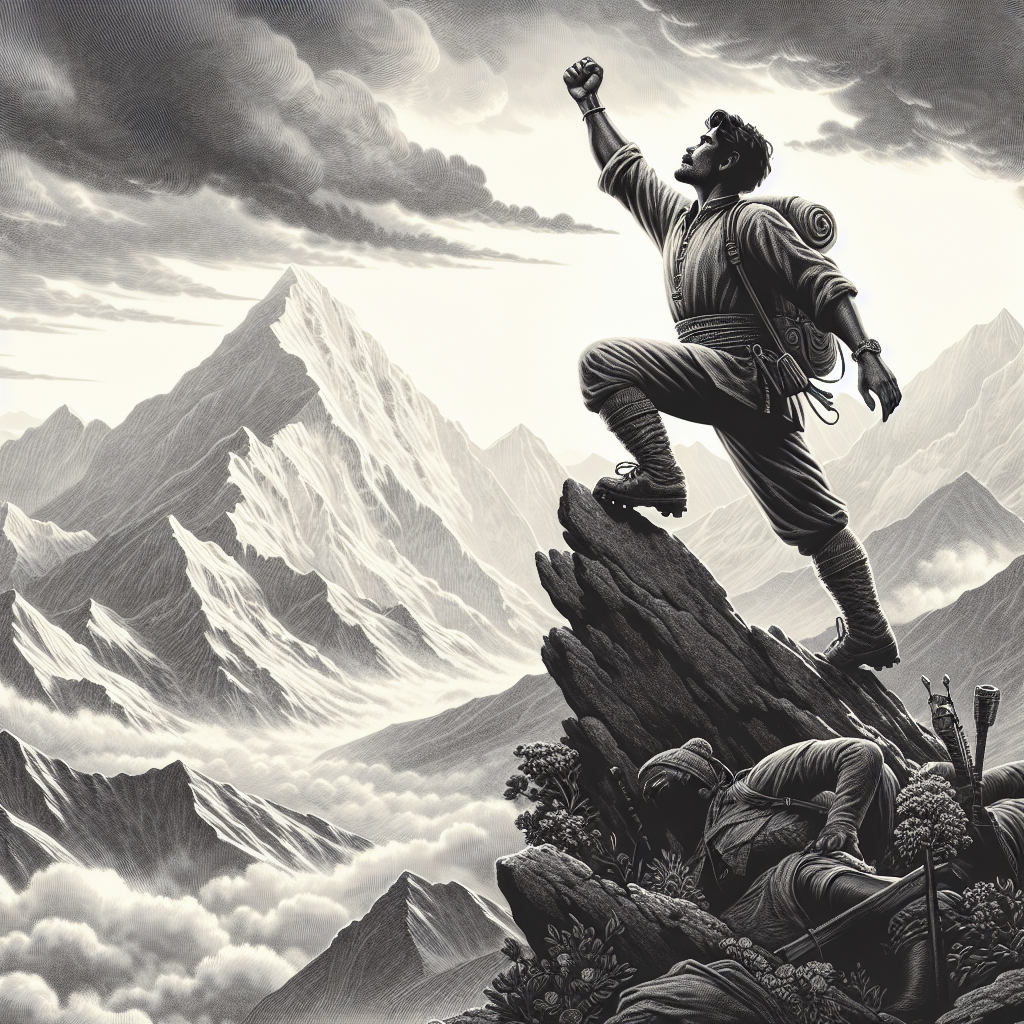How Did Historical Figures Overcome Their Challenges?
Have you ever wondered how revered historical figures managed to conquer their obstacles and achieve greatness? From towering leaders like Abraham Lincoln to trailblazing scientists like Marie Curie, these individuals faced their fair share of challenges and setbacks. Yet, they found ways to overcome adversity and leave a lasting impact on the world. In this article, we will explore the strategies and mindsets adopted by historical figures to triumph over their challenges, offering timeless lessons and inspiration for navigating our own hurdles.
Physical Challenges
Illnesses and Disabilities
Dealing with illnesses and disabilities can present significant physical challenges. Whether it’s a chronic illness, a physical disability, or a temporary health issue, it can severely impact your daily life and limit your physical abilities. However, throughout history, many individuals have demonstrated tremendous strength and resilience in overcoming these challenges.
One such example is Helen Keller, an American author, and activist who was both blind and deaf. Despite her disabilities, Helen Keller overcame immense physical barriers with the help of her teacher, Anne Sullivan. Through patience, persistence, and innovation, Keller learned to communicate and became a renowned advocate for people with disabilities.
Injuries and Accidents
Injuries and accidents can suddenly and dramatically change the course of your life. They can leave you physically impaired, in chronic pain, or with limited mobility. Yet, throughout history, numerous individuals have managed to overcome these challenges and go on to achieve great things.
One inspiring example is Frida Kahlo, a Mexican artist known for her colorful self-portraits. Kahlo experienced a severe bus accident that left her with lifelong chronic pain and disabilities. Despite her physical hardships, she channeled her pain into her artwork and became an iconic figure in the art world. Kahlo’s determination and resilience serve as a testament to the human spirit’s ability to adapt and overcome physical obstacles.
Physical Limitations
Sometimes, individuals face physical challenges due to their own limitations, such as lack of strength, endurance, or flexibility. These limitations can manifest in various contexts, from sports to everyday tasks, and may require significant effort and perseverance to overcome.
An excellent example of triumph over physical limitations is Stephen Hawking, a distinguished theoretical physicist. Hawking was diagnosed with amyotrophic lateral sclerosis (ALS) at a young age, which gradually led to a loss of motor control and confinement to a wheelchair. Despite his physical limitations, Hawking made groundbreaking contributions to the field of cosmology and became one of the most influential scientists of his time.
Educational Challenges
Lack of Access to Education
Access to education is a fundamental right that should be available to all individuals, regardless of their background or circumstances. However, throughout history, many people have faced educational challenges due to factors such as poverty, discrimination, or lack of resources.
Malala Yousafzai, a Pakistani activist for female education, fought against the Taliban’s ban on girls’ education in her region. Despite facing threats and an assassination attempt, she refused to be silenced and became a global advocate for girls’ access to education. Yousafzai’s determination to overcome the lack of access to education is a testament to the transformative power of learning.
Learning Disabilities
Learning disabilities can present unique challenges in the educational journey. Individuals with learning disabilities may struggle with reading, writing, or processing information, making it difficult for them to succeed in traditional educational environments.
Albert Einstein, one of the greatest scientific minds in history, faced significant learning challenges throughout his academic journey. He had difficulty with language and was slow to speak as a child. Despite his learning disabilities, Einstein’s immense curiosity, perseverance, and unconventional ways of thinking allowed him to excel in mathematics and physics, ultimately leading to his groundbreaking theories.
Unconventional Methods of Learning
Sometimes, individuals face challenges in traditional educational settings and have to find alternative methods of learning. These unconventional approaches allow them to acquire knowledge and skills outside the confines of traditional classrooms.
A prime example is Thomas Edison, a prominent inventor who holds over 1,000 patents. Edison faced difficulty in traditional schooling due to his hyperactivity and persistent questioning. However, he found solace in books and conducted countless experiments in his basement laboratory. Through his self-directed learning, Edison revolutionized various industries with inventions such as the phonograph and the electric light bulb.
Social Challenges
Discrimination and Prejudice
Discrimination and prejudice exist in diverse forms, from racial and gender biases to social and economic inequalities. These challenges can profoundly impact individuals’ social experiences and limit their opportunities for growth and success.
Rosa Parks, often referred to as the “Mother of the Civil Rights Movement,” experienced discrimination and racial prejudice throughout her life. In 1955, she famously refused to give up her bus seat to a white passenger, sparking the Montgomery Bus Boycott and becoming an icon in the fight against racial segregation. Parks’ act of defiance and her tireless advocacy for civil rights inspire countless individuals to stand up against discrimination.
Social Inequality
Social inequality refers to the unequal distribution of resources, opportunities, and privileges within society. It can result in limited access to education, healthcare, and employment, creating significant challenges for individuals striving to overcome their circumstances.
Nelson Mandela, a South African anti-apartheid revolutionary and politician, faced the deep-seated social inequality of apartheid. Despite being imprisoned for 27 years, Mandela emerged as a resilient leader and played a pivotal role in dismantling apartheid and fighting for equality and social justice. Mandela’s unwavering commitment to overcoming social inequality serves as an inspiration for individuals facing systemic injustice.
Isolation and Loneliness
Feelings of isolation and loneliness can be incredibly challenging and impact individuals’ mental and emotional well-being. They can arise from various factors, such as living in remote areas, experiencing rejection, or facing social stigma.
Vincent van Gogh, a Dutch post-impressionist painter, struggled with isolation and loneliness throughout his life. Despite a lack of recognition and financial struggles, Van Gogh continued to create art driven by his passion and inner turmoil. His unique artistic style and the emotional depth of his works resonate with millions of people worldwide, demonstrating that even in the face of loneliness, one can find solace and connection through creative expression.
Economic Challenges
Poverty and Lack of Resources
Poverty and lack of resources can pose significant economic challenges, creating barriers to basic necessities and opportunities for individuals and communities. Overcoming these challenges often requires resilience, resourcefulness, and support from others.
Oprah Winfrey, an American media mogul, actress, and philanthropist, grew up in poverty and faced numerous adversities throughout her childhood. Through hard work, determination, and an undeniable talent for connecting with people, Winfrey overcame poverty to become one of the most influential figures in the entertainment industry. Her success not only transformed her own life but also inspired millions around the world to believe in their own potential.
Financial Instability
Financial instability can result from factors such as job loss, economic downturns, or personal financial mismanagement. It can lead to stress, uncertainty, and restricted opportunities for personal and professional growth.
J.K. Rowling, the author of the immensely popular Harry Potter series, experienced financial instability as a single mother on welfare. Despite these hardships, Rowling continued to pursue her passion for writing and created a beloved literary world that captured the imaginations of millions. Her determination to overcome financial instability and her subsequent philanthropic efforts highlight the importance of perseverance and giving back.
Lack of Opportunities
Lack of opportunities, whether due to factors such as geographical location, socio-economic status, or discrimination, can hinder individuals’ ability to reach their full potential. Overcoming this challenge often requires resourcefulness, resilience, and a willingness to seize any available opportunity.
Elon Musk, a tech entrepreneur and CEO of SpaceX and Tesla, faced a lack of opportunities while growing up in South Africa. Despite the limitations, Musk displayed a remarkable ability to seize every opportunity that came his way, eventually becoming a key figure in the fields of electric vehicles and space exploration. Musk’s relentless pursuit of opportunities demonstrates the power of determination and an entrepreneurial mindset in overcoming adversity.
Political Challenges
Oppressive Regimes
Oppressive regimes and authoritarian governments can suppress individual freedoms, deny human rights, and restrict opportunities for personal and societal growth. Under such circumstances, individuals often face immense challenges in expressing their opinions and pursuing their dreams.
Aung San Suu Kyi, a Burmese politician and Nobel Peace Prize laureate, spent many years under house arrest due to her activism against the oppressive military regime in Myanmar. Throughout her incarceration, Suu Kyi remained an unwavering champion of democracy and human rights, eventually leading her party to victory in the country’s elections and becoming the State Counsellor of Myanmar. Suu Kyi’s resistance and resilience symbolize the indomitable spirit of those challenging oppressive regimes.
Suppression of Ideas
The suppression of ideas, whether through censorship, intellectual persecution, or cultural restrictions, can hinder intellectual and creative expression. Overcoming this challenge often requires courage, resilience, and the determination to challenge the status quo.
Galileo Galilei, an Italian astronomer, physicist, and mathematician, faced significant suppression of his ideas by the Catholic Church during the Scientific Revolution. Despite the threat of persecution and imprisonment, Galileo fearlessly defended heliocentrism, the idea that the Earth revolves around the Sun, revolutionizing our understanding of the universe. Galileo’s unwavering commitment to the pursuit of truth inspires individuals to challenge the suppression of ideas even in the face of daunting opposition.
Victimization and Persecution
Victimization and persecution can result from factors such as race, religion, ethnicity, or political beliefs. Those who face such challenges often endure trauma, discrimination, and injustices, but many historical figures have defied these hardships, leaving enduring legacies.
Anne Frank, a Jewish girl during the Holocaust, spent two years hiding in an attic before being discovered and sent to a concentration camp. Despite the unimaginable horrors she experienced, Frank’s diary, which she kept during her time in hiding, continues to provide insight into the human spirit’s ability to find hope and strength in the darkest of times. Her courageous spirit and unwavering optimism serve as a powerful testament to the resilience of the human spirit.
Personal Challenges
Mental Health Issues
Mental health issues represent significant personal challenges, often accompanied by stigma and a lack of understanding. Individuals facing mental health challenges must navigate their emotions, thoughts, and behaviors while seeking support and building resilience.
Abraham Lincoln, the 16th President of the United States, battled with depression throughout his life. Despite his mental health struggles, Lincoln exhibited exceptional leadership during a divisive period in American history, guiding the country through the Civil War and overseeing the abolition of slavery. Lincoln’s capacity to manage his mental health challenges while fulfilling his duties as president emphasizes the importance of seeking help and fostering resilience in the face of personal struggles.
Addictions and Dependencies
Addictions and dependencies, whether related to substances, behaviors, or relationships, can have profound impacts on individuals’ lives and their ability to function. Overcoming these personal challenges requires dedication, support, and a commitment to change.
Sir Anthony Hopkins, an acclaimed actor, struggled with alcoholism early in his career. However, through sheer determination, treatment, and the support of loved ones, Hopkins achieved sobriety and went on to become one of the most respected actors of his generation. His remarkable recovery and continued success underscore the importance of seeking help and finding healthy ways to overcome personal addictions and dependencies.
Self-doubt and Fear
Self-doubt and fear can hinder personal growth, limit opportunities, and prevent individuals from realizing their full potential. Overcoming these internal challenges requires self-reflection, resilience, and the ability to push through discomfort.
Maya Angelou, an American poet, memoirist, and civil rights activist, overcame a difficult childhood and struggled with self-doubt for much of her life. However, Angelou refused to let her insecurities define her, eventually becoming a literary icon and influential figure in the fight for equality and social justice. Her resolute belief in the power of her voice serves as an inspiration to individuals grappling with self-doubt and fear, encouraging them to confront their inner demons and pursue their dreams.
Relationship Challenges
Difficult Family Background
Difficult family backgrounds can present significant challenges in an individual’s life, impacting their emotional well-being and relationships. Overcoming the traumas and obstacles associated with a challenging family background often requires resilience, self-compassion, and outside support.
Sigmund Freud, an Austrian neurologist and the founder of psychoanalysis, grew up in a dysfunctional family plagued by financial struggles and interpersonal conflicts. Despite these challenges, Freud dedicated his life to understanding the human mind and revolutionizing the field of psychology. His work on the unconscious mind, dreams, and psychoanalysis continues to shape our understanding of human behavior and mental health.
Unsupportive Partners
Unsupportive partners can undermine individuals’ growth, drain their confidence, and impede their pursuit of personal goals. Overcoming the challenges of an unsupportive relationship often involves setting boundaries, self-advocacy, and seeking healthier connections.
Eleanor Roosevelt, a prominent American political figure and human rights advocate, faced significant challenges in her marriage to President Franklin D. Roosevelt. Despite her husband’s infidelity and the constraints of her traditional role as a First Lady, Eleanor Roosevelt found her own voice and became a leading advocate for social justice, equality, and human rights. Her ability to rise above the limitations imposed by her relationship serves as a testament to the power of self-worth and resilience.
Conflict and Betrayal
Conflict and betrayal can deeply wound individuals emotionally, strain relationships, and challenge one’s trust in others. Overcoming these challenges requires forgiveness, open communication, and a commitment to rebuilding trust.
Nelson Mandela, in addition to his fight against apartheid, also faced personal challenges within his own family. His marriage to Winnie Mandela experienced significant strain due to their prolonged separation during his imprisonment and accusations of infidelity. However, despite these conflicts, Nelson Mandela and Winnie Mandela both worked towards forgiveness and reconciliation. Their ability to navigate personal conflict and betrayal demonstrates the power of forgiveness and the importance of maintaining love and compassion even in difficult circumstances.
Career Challenges
Obstacles in Professional Growth
Obstacles in professional growth can arise from various factors, such as limited opportunities, discrimination, or lack of recognition. Overcoming these challenges often requires persistence, resilience, and a willingness to take risks.
Madam C.J. Walker, an African-American entrepreneur and philanthropist, faced numerous obstacles, including racism and sexism, on her path to success. Despite these challenges, Walker persevered and became the first self-made female millionaire in the United States by building a successful beauty and haircare company. Her story highlights the importance of determination and self-belief in overcoming career challenges and breaking barriers.
Failure and Rejection
Failure and rejection are inevitable parts of life, particularly in career pursuits. Overcoming the fear of failure, learning from setbacks, and maintaining perseverance are essential in navigating the challenges they present.
Walt Disney, the iconic creator behind Disney’s beloved characters and theme parks, faced multiple rejections throughout his career. Despite experiencing bankruptcy and initial failures, Disney never gave up on his vision and continued to innovate in the world of animation. His resilience and unwavering belief in his dreams eventually led to the creation of one of the most successful and influential entertainment companies in history.
Balancing Work-Life
Balancing work and personal life can present significant challenges, often leading to stress, burnout, and strained relationships. Achieving a healthy work-life balance requires setting priorities, establishing boundaries, and nurturing personal well-being.
Sheryl Sandberg, the Chief Operating Officer of Facebook and an influential businesswoman, faced the challenge of balancing her demanding career with her role as a mother. After the sudden death of her husband, she realized the importance of prioritizing what truly matters and reevaluated her approach to work-life balance. Sandberg’s experiences and advocacy for gender equality in the workplace have sparked conversations about the challenges faced by working parents and the need for supportive policies.
Creative Challenges
Artistic Blocks
Artistic blocks, commonly known as creative blocks, can impede an artist’s ability to generate ideas or produce their best work. Overcoming these challenges requires patience, exploration, and a willingness to embrace vulnerability.
Pablo Picasso, one of the most influential artists of the 20th century, faced creative blocks throughout his career. However, he refused to let these obstacles define him and continuously reinvented his style, exploring new artistic directions that revolutionized modern art. Picasso’s resilience and willingness to push past creative blocks serve as a reminder to artists that challenges can often be the catalyst for growth and artistic innovation.
Criticism and Negativity
Criticism and negativity can be disheartening and hinder an artist’s creativity and self-confidence. Overcoming these challenges involves developing resilience, maintaining self-belief, and finding support from like-minded individuals.
Vincent van Gogh, mentioned earlier for his struggle with isolation and loneliness, also faced harsh criticism and rejection from the artistic community during his lifetime. Despite the negative feedback, Van Gogh remained committed to his unique artistic vision, ultimately creating masterpieces that continue to captivate the world. His ability to rise above criticism and negativity exemplifies the importance of staying true to one’s artistic voice and vision.
Maintaining Originality
Maintaining originality in a world saturated with trends and influences can be a daunting challenge for artists. Overcoming this challenge requires self-reflection, embracing individuality, and embracing the courage to think outside the box.
Frida Kahlo, previously mentioned for overcoming physical challenges, also demonstrated a remarkable ability to maintain her artistic originality. Despite living in a male-dominated art world and being influenced by various artistic movements, Kahlo’s work remained unmistakably her own, combining elements of surrealism and traditional Mexican art. Her dedication to staying true to her unique artistic voice continues to inspire artists to embrace their individuality and create authentically.
Spiritual Challenges
Religious Persecution
Religious persecution can present severe challenges to individuals’ spiritual beliefs, personal freedom, and overall well-being. Overcoming these challenges often requires deep faith, resilience, and the pursuit of religious tolerance and understanding.
Dalai Lama, the spiritual leader of Tibetan Buddhism, faced religious persecution when his homeland was invaded by China and he was forced into exile. Despite these challenges, the Dalai Lama has become a global advocate for peace, nonviolence, and compassion, promoting religious harmony and understanding. His ability to remain steadfast in his beliefs and promote unity serves as an inspiration for those facing religious persecution and striving for spiritual fulfillment.
Existential Crisis
Existential crises, marked by a deep questioning of life’s meaning and purpose, can be profoundly challenging and disorienting. Overcoming these crises involves self-reflection, philosophical exploration, and finding personal meaning in the face of existential uncertainty.
Friedrich Nietzsche, a 19th-century philosopher, experienced an existential crisis that profoundly impacted his entire philosophical outlook. Through an intense process of introspection and intellectual inquiry, Nietzsche developed the concept of “amor fati” or the love of fate, embracing the idea that life’s challenges and uncertainties are fundamental to personal growth and fulfillment. Nietzsche’s transformation serves as a reminder that even the most profound existential crises can lead to profound philosophical insights and personal growth.
Maintaining Faith
Maintaining faith in the face of adversity and doubt can be a significant religious and spiritual challenge. Overcoming this challenge requires introspection, seeking support from like-minded individuals, and finding personal connections to one’s faith.
Mahatma Gandhi, a political and spiritual leader who played a crucial role in India’s independence movement, faced numerous obstacles in his pursuit of justice and nonviolence. Throughout his life, Gandhi’s unwavering faith in Hinduism and the power of nonviolence guided his actions and inspired others. His ability to maintain faith in the transformative potential of humanity serves as a powerful example of dedication to spiritual beliefs even in the face of immense challenges.
In conclusion, throughout history, individuals from diverse backgrounds have faced a multitude of challenges. Whether physical, educational, social, economic, political, personal, relationship-based, career-related, creative, or spiritual challenges, their stories of resilience, determination, and innovation serve as inspiration for overcoming obstacles. From historical figures like Helen Keller, Rosa Parks, Albert Einstein, Frida Kahlo, to contemporary individuals such as Malala Yousafzai, Elon Musk, Oprah Winfrey, there is a wealth of knowledge and inspiration to draw upon when confronting challenges in various aspects of life. By embracing the lessons learned from these individuals, we can find our inner strength to overcome our own challenges and strive for a brighter future.







